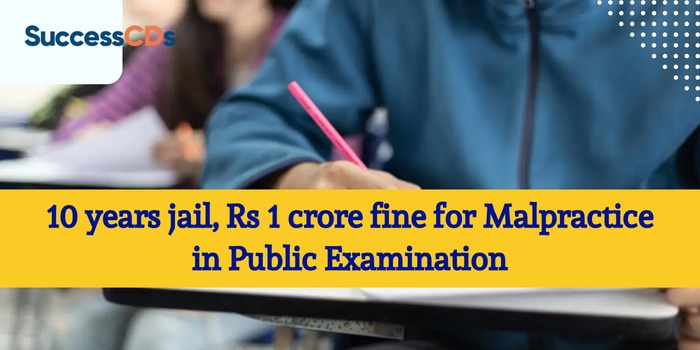Public Examinations (Prevention of Unfair Means) Bill 2024 – All you need to know
Public Examinations (Prevention of Unfair Means) Bill 2024 – On Monday, the Government introduced a Bill in Lok Sabha aimed at penalizing “malpractices in public examinations” with jail terms of 3 to 10 years and fines which can exceed Rs 1 crore for those found guilty. The Public Examinations (Prevention of Unfair Means) Bill 2024 extends its applicability to central recruitment and entrance exams conducted by key entities such as the Union Public Service Commission (UPSC), Staff Selection Commission (SSC), Railway Recruitment Boards (RRBs), Institute of Banking Personnel Selection (IBPS), and National Testing Agency (NTA). The NTA oversees exams like JEE for engineering, NEET for medical, and CUET for undergraduate and postgraduate studies.
Additionally, the legislation covers all central ministries, departments, and their recruitment offices. The absence of a specific substantive law to address malpractices in public examinations by the central government and its agencies is cited as the reason for introducing this bill.
“Unfair means” are defined as acts or omissions done by individuals or groups for monetary or wrongful gain, including leakage of question papers, collusion to leak papers, or unauthorized access to exam materials.
Offences under the Bill are cognizable, non-bailable, and non-compoundable. Punishments include imprisonment ranging from three to five years and fines up to Rs 10 lakh, with additional imprisonment in case of default in fine payment. Harsher punishment is prescribed for organized paper leaks, with imprisonment ranging from five to ten years and fines starting from Rs 1 crore.
The objective of the Bill is to enhance transparency, fairness, and credibility in public examination systems, reassuring youth that their sincere efforts will be duly rewarded and their future secured.
While the Bill applies to central authorities, it will serve as a model for states. Some states, such as Gujarat and Assam, already have their own legislation addressing similar concerns.
Instances of paper leaks at both state and central levels underscore the necessity of such measures, with recent cases involving arrests and investigations by authorities.
